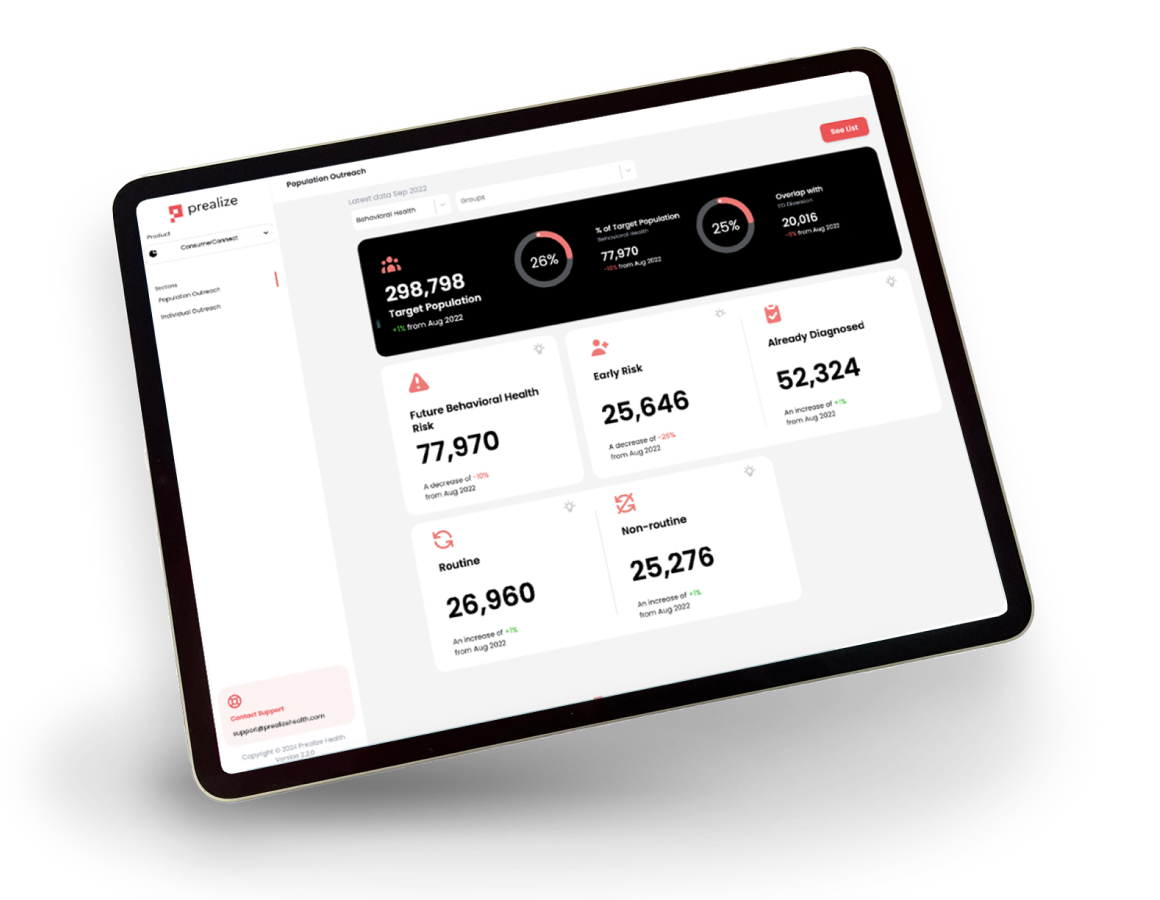
The Future of Mental Health Care: AI-Powered Predictive Analytics
With the U.S. spending $280 billion annually on behavioral health conditions, the time to treat mental health as an integral part of overall health is now [1]. AI-powered predictive analytics are not just a game-changer for mental health care—they’re a lifeline, capable of accurately identifying at-risk patients earlier and enabling proactive interventions that can turn the tide before it’s too late.
A Hidden Epidemic
According to the Centers for Disease Control (CDC), mental illness is among the most common health conditions in the U.S., with one in five adults living with the disease [2]. Yet, mental health issues often slip through the cracks, especially in the early stages, due to diagnostic challenges and societal stigma. This underdiagnosis means many are suffering in silence, without the help they desperately need. The mental health crisis is not just about those with severe disorders but also those who are the early stages of and experiencing symptoms or acute signs of mental distress, many of these Americans are left to fend for themselves in a system stretched thin.
The Race Against Time
One of the greatest hurdles in mental health care is connecting patients with the right services in the right care delivery location before a crisis hits. But here is the breakthrough: AI and predictive analytics can predict not just who will seek care for behavioral health, but also when their care will occur.
With leveraging an AI Foundation model as discussed in our previous blog, it is possible to accurately predict undiagnosed behavioral health conditions. The previous generation of AI models could only operate accurately when predicting behavioral health in the broadest possible sense, but with an AI Foundation model, that broad category can be broken down into predictions for specific conditions such as mild/moderate depression, severe depression, anxiety, mood disorders, psychosis, etc. Because the model continuously learns from the data, it can build a longitudinal health timeline for patients, offering accurate insight into what healthcare events will happen and when (1-3 months from now, 4-6, etc.). This foresight offers a critical window of opportunity to prioritize outreach and supportive resources much earlier, before a mental health crisis occurs.
This predictive power enables timely, targeted interventions that can prevent a crisis, reduce stigma, improve patient outcomes, and lower healthcare costs. It is about matching patients with the right care at the right time, whether they need a psychiatrist, telehealth support, or self-directed resources, in the most preferred way.
The Overlooked Connection: Chronic Illness and Mental Health
Around 60% of Americans live with chronic diseases such as cardiovascular disease, diabetes, obesity, and arthritis. These individuals are significantly more likely to also suffer from depression. Depression co-occurs in 27% of cardiovascular cases, 27% of diabetes patients, more than 40% of cancer patients, and a staggering 85% of those with chronic pain [3]. Ignoring mental health in these patients’ treatment plans can lead to dire consequences—poor medication adherence, higher risk of substance abuse, and a cascade of social issues like homelessness and incarceration.
For those battling both chronic illness and mental health issues, treatment must be holistic and tailored. For instance, someone with chronic pain and depression needs not only medical interventions but also psychological support to manage their pain and foster positive thinking. This comprehensive approach ensures that both the physical and mental aspects of their health are addressed, building trust and improving outcomes.
Early Intervention: A Matter of Life and Death
Overlooking mental health in the management of chronic illness can exacerbate the illness itself. Take Maggie, a 55-year-old woman with chronic pain, tobacco use disorder, and depression. Her depression led to weight gain and increased opiate use, creating a downward spiral of worsening health and rising healthcare costs. But imagine if predictive analytics had flagged Maggie’s risk factors earlier. With proactive outreach and support, Maggie could have been connected to therapy, smoking cessation programs, and alternative pain management solutions sooner, potentially avoiding the need for opiates altogether.
Maggie’s story underscores the critical importance of early intervention. Reaching her before she started using opiates or gained weight could have dramatically improved her quality of life. Predictive analytics fueled by artificial intelligence can not only identify at-risk patients but also identify when they are likely to incur a health event, such as an emergency department visit. With this data, health plans and providers can intervene early and improve a patient’s health journey and outcome.
This early intervention is not just about reducing healthcare costs; it’s about giving patients the chance to take smaller, manageable steps toward better health, rather than facing an insurmountable climb.
The urgency is clear: we must harness the power of AI and predictive analytics to identify at-risk individuals and intervene before much earlier – because we can!
[1] Centers for Medicare & Medicaid Services. National Health Expenditure Data. [Link]
[2] Centers for Disease Control and Prevention. Mental Illness. [Link]
[3] Johns Hopkins Bloomberg School of Public Health. The Intersection of Mental Health and Chronic Disease. [Link]

Experience the Prealize Difference
We invite you to experience the transformative power of unparalleled accuracy. Request a demo today and see how Prealize can empower your organization to achieve better health outcomes, reduced costs, and a new era or proactive care.